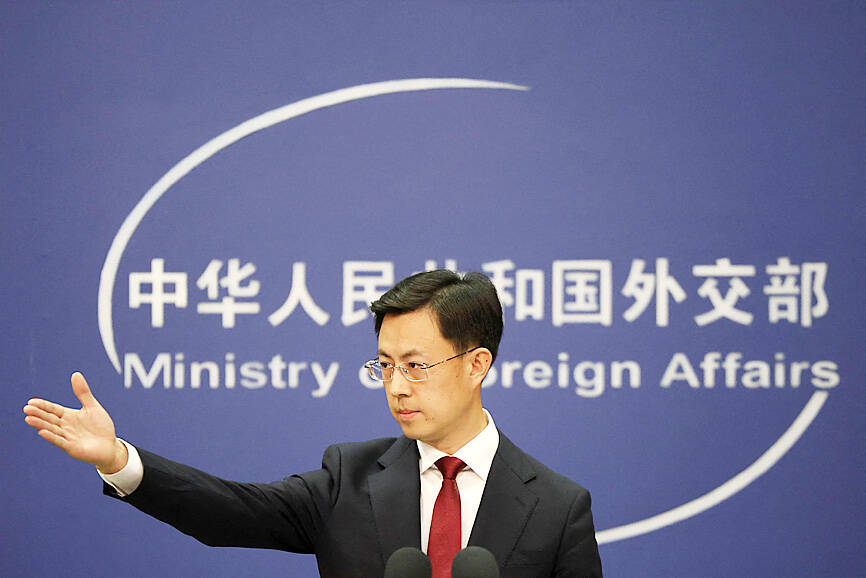China yesterday said it had “destroyed” an intelligence network set up by the Philippine espionage agency and arrested three spies from the country.
State broadcaster China Central Television (CCTV) reported that authorities had identified one of the suspected spies as a Philippine national who had lived and worked in China long-term and had been found conducting espionage near military facilities.
The CCTV report included a video of his arrest and what appeared to be a recorded confession.

Photo: Reuters
He was recruited by Philippine intelligence services to “take advantage of his long-term residence in China to conduct espionage activities in China and collect sensitive information, especially on military deployment,” CCTV reported.
He came close to military facilities multiple times and “conducted close observation and secret photography,” it added.
The three individuals had been recruited by the same Philippine spy since 2021 and received regular payment for their work, it said.
They were also tasked with “assisting the Philippine spy intelligence agency in selecting and developing personnel, and expanding its intelligence network in China,” it said.
They had provided “a large amount of military-related and confidential video materials” to Philippine agents, “causing serious harm to China’s national security and interests,” CCTV quoted a Chinese national security officer as saying.
Philippine National Security Council spokesman Jonathan Malaya told reporters that the Philippine Department of Foreign Affairs was “currently confirming these reports and the involvement of any Philippine national, if any.”
“We have no further comment as of this time until we are able to verify these new reports,” Malaya said.
Asked about the charges, the Chinese Ministry of Foreign Affairs said that it would “handle the cases in accordance with the law, and will also safeguard the legitimate rights and interests of the relevant personnel.”
Chinese Ministry of Foreign Affairs spokesman Guo Jiakun (郭嘉昆) also accused Manila of having “fabricated several so-called Chinese espionage cases.”
“China urges the Philippines to stop chasing shadows and pinning labels on people,” Guo said.

WAITING GAME: The US has so far only offered a ‘best rate tariff,’ which officials assume is about 15 percent, the same as Japan, a person familiar with the matter said Taiwan and the US have completed “technical consultations” regarding tariffs and a finalized rate is expected to be released soon, Executive Yuan spokeswoman Michelle Lee (李慧芝) told a news conference yesterday, as a 90-day pause on US President Donald Trump’s “reciprocal” tariffs is set to expire today. The two countries have reached a “certain degree of consensus” on issues such as tariffs, nontariff trade barriers, trade facilitation, supply chain resilience and economic security, Lee said. They also discussed opportunities for cooperation, investment and procurement, she said. A joint statement is still being negotiated and would be released once the US government has made

NEW GEAR: On top of the new Tien Kung IV air defense missiles, the military is expected to place orders for a new combat vehicle next year for delivery in 2028 Mass production of Tien Kung IV (Sky Bow IV) missiles is expected to start next year, with plans to order 122 pods, the Ministry of National Defense’s (MND) latest list of regulated military material showed. The document said that the armed forces would obtain 46 pods of the air defense missiles next year and 76 pods the year after that. The Tien Kung IV is designed to intercept cruise missiles and ballistic missiles to an altitude of 70km, compared with the 60km maximum altitude achieved by the Missile Segment Enhancement variant of PAC-3 systems. A defense source said yesterday that the number of

Taiwanese exports to the US are to be subject to a 20 percent tariff starting on Thursday next week, according to an executive order signed by US President Donald Trump yesterday. The 20 percent levy was the same as the tariffs imposed on Vietnam, Sri Lanka and Bangladesh by Trump. It was higher than the tariffs imposed on Japan, South Korea and the EU (15 percent), as well as those on the Philippines (19 percent). A Taiwan official with knowledge of the matter said it is a "phased" tariff rate, and negotiations would continue. "Once negotiations conclude, Taiwan will obtain a better

FLOOD RECOVERY: “Post-Typhoon Danas reconstruction special act” is expected to be approved on Thursday, the premier said, adding the flood control in affected areas would be prioritized About 200cm of rainfall fell in parts of southern Taiwan from Monday last week to 9am yesterday, the Central Weather Administration (CWA) said. Kaohsiung’s Taoyuan District (桃源) saw total rainfall of 2,205mm, while Pingtung County’s Sandimen Township (三地門) had 2,060.5mm and Tainan’s Nanhua District (南化) 1,833mm, according to CWA data. Meanwhile, Alishan (阿里山) in Chiayi County saw 1,688mm of accumulated rain and Yunlin County’s Caoling (草嶺) had 1,025mm. The Pingtung County Government said that 831 local residents have been pre-emptively evacuated from mountainous areas. A total of 576 are staying with relatives in low-lying areas, while the other 255 are in shelters. CWA forecaster